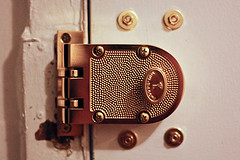15 Expert Tips to Securing Your Home Before a Trip
1 June 2012
Whether you’re traveling for a two-day business conference or a two-week vacation, you’re going to want to be sure your home is secure and safe from vandalism, break-ins, and property disasters while you are gone.
Avoid having to file an expensive insurance claim when you return by following these home security tips from experts in various industries.
5 Home Security Tips from Travel Experts
According to many travel experts, the key is to make your home look lived in even when you’re not there.
- Place a hold on mail, newspaper, and other deliveries while you’re gone. Nothing says ‘rob me’ like an overstuffed mailbox or a litter of newspapers across your front step.
- Park a car in the driveway each night. Often a neighbor won’t mind parking in your spot and the occasional shift of position makes your home look occupied.
- Install timers on various lights around your home so it looks like someone is there. Did you know they make timers that you can set to go on randomly? Try your local home improvement store for options.
- Hire a lawn care company if you’ll be gone for awhile and arrange for snow to be shoveled if you’ll be away during the winter.
- Put motion detectors on your outside lights. This is an excellent security measure because the lights are triggered when someone is inside the range of the sensor.
Bonus money-saving tip: that last one is also a great money-saver even when you’re at home.
5 Home Security Tips from Law Enforcement Experts
Law enforcement experts also have great ideas on home security when you travel. They recommend that travelers:
- Join or start a neighborhood watch group. These are folks uniquely positioned and interested in watching your home when you’re gone and you can do the same for them.
- Keep your valuables secured in a safe deposit box. These include you will, expensive jewelry, cash, and other things that can be easily stolen and sold.
- Never give parking lot attendants and others who may temporarily drive your car your keyring. Your house key should never be handed to potential thieves.
- Never leave a ‘hidden’ or ‘emergency’ key outside your home. Those are too easy to find and give a would-be thief very easy access. If you need an alternate way to get in, try a lock box or leave a key with someone you trust.
- Install an alarm system if you can. Law enforcement experts have indicated that homes without security systems are three times as likely to be burglarizes as those with one.
Bonus money-saving tip: most homeowner’s policies will give you a discount if you install an alarm system.
5 Home Security Tips from Property Management Experts
Protecting your home from electrical mishaps, plumbing disasters, and fires while you’re gone is also important. Before you leave:
- Unplug everything but the freezer, refrigerators, and items you have put on timers. This will not only save money on your electric bill, but it will help avoid electrical problems.
- If you’ll be gone for more than a week, turn off the internal water valve. Too many homeowners have come home to find an old pipe broke or the washing machine hose failed and their home is flooded.
- Secure all the doors and windows by locking them before you leave. Sliding glass doors should have devices as simple as an appropriately sized rod dropped into the track to prevent an intruder from forcing the lock and opening the door.
- Disable your garage door opener. Tech-savvy burglars can work out the code to trigger the door to open and gain access to your home.
- Install an automatic thermostat. This will keep the temperature in your home regulated. You can also set the temperatures appropriately to save money while you are gone, but still prevent disasters like frozen pipes.
Bonus money-saving tip: Consider setting your water heater on the lowest possible setting when you travel too – this will keep it functional while saving you money on your energy bills. Just remember to turn it back up before your first shower!
Damian Tysdal is the founder of CoverTrip, and is a licensed agent for travel insurance (MA 1883287). He believes travel insurance should be easier to understand, and started the first travel insurance blog in 2006.
